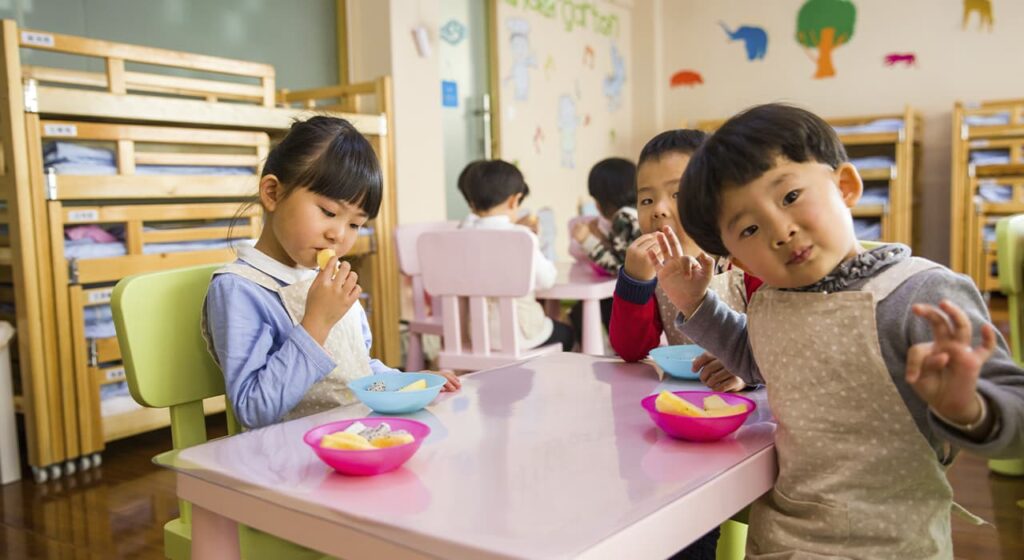Kindergarten has a special place in the educational trajectory. Up to the age of 6 or 7, preschoolers are actively developing, learning to interact with their environment, and acquiring the first knowledge and skills that will be useful in school. If the family changes country of residence, preschool education plays an important role in adaptation. In a foreign kindergarten, the child can learn a foreign language, learn cultural norms and later easily integrate into the educational system. In this article we will look at the peculiarities of preschool education in different countries.
Kindergartens in different countries
The task of parents is to choose a suitable kindergarten with modern teaching methods, where the child will feel comfortable and explore the world around him or her in a playful way. At the same time, it should be taken into account that kindergartens in different countries have their own twists and turns.
Lack of beds, optional nap time during the day, walks in bad weather – all this may surprise foreign parents.
Sweden
You can send your baby to kindergarten from the age of 1, even if he can’t go potty yet. Children often sleep in sleeping bags on hiking mats or in special hammocks, and the dining room regularly serves dishes from India, Mexico or Thailand. The kids always have plenty of freedom in their choice of activities, but the caretakers are strict about safety and observing basic rules.
Germany
Children are taught in mixed groups and learn to interact not only with their peers. Everyone can choose what he wants to eat for breakfast, and serve himself. The older ones help the younger ones and the newcomers, and this is encouraged by the teachers. During the day a child can choose an activity to his/her liking, usually the group spends time outdoors. It is not obligatory to sleep in the daytime, you can go to another room and play or draw in silence.
China
Chinese children sleep with their clothes on, as the kindergarten windows are always open. At the beginning of the week, the flag is raised and the anthem is sung. Many activities take place outside if there is no smog in the city. The pride of any kindergarten is a foreign teacher who can teach English.
USA
In private American kindergartens, children usually sleep in their shoes – for safety reasons, so that in case of fire everyone has time to get out quickly. Children most often bring their own food in a lunchbox, and they may be offered macaroni and cheese, pizza, or nuggets for a snack.
Pre-school education in the UK
All British nursery schools follow a single Early Years Foundation Stage system based on many years of research. The formula for a British preschool is: Unique Child + Positive Interaction + Developmental Environment = Learning and Development.
The creators of the system emphasize that to develop a child it is necessary to take into account his or her individual characteristics, create positive experiences with teachers, and provide a suitable environment in which everyone can be inquisitive and explore the world safely.
The curriculum consists of six units:
Communication, Language and Literacy (writing, reading)
Physical development (sports, health)
Personal, social and emotional development (self-esteem, interaction, behavior, self-care, self-control, teamwork)
Knowledge and understanding of the world (information technology, culture and religion, sense of time)
Mathematical development
Expressive arts and design
British children start attending Kindergarten from the age of 3-6 months, and by the age of 5 they are enrolled in elementary school. When choosing a preschool, parents are guided by the Office for Standards in Education, Children’s Services and Skills rating, and preschools rated Outstanding or Good are considered good.
Attending kindergarten is quite expensive: about £1,500 a month. Public pre-schools have an advantageous option for working parents: 15 free hours a month. It is also possible to get a voucher through the employer and pay less due to the fact that this amount will not be taxed.
If the baby does not speak English, he will not be left without help – experienced teachers will find another way to communicate. Nevertheless, it is recommended to teach the child basic words, so he can tell the caregiver that he wants to sleep, eat, go to the toilet, etc. In a new language environment, children adapt faster than adults, so they can understand English in a few months.
Parents who are willing to send their child to study abroad alone can take advantage of boarding at the chosen school. However, many educational institutions accept children under the age of 7 years, although a student visa may be obtained from the age of 4 years.
